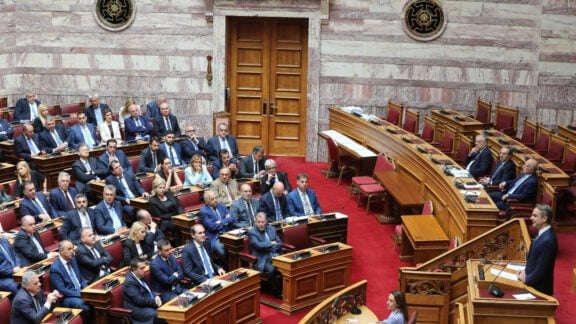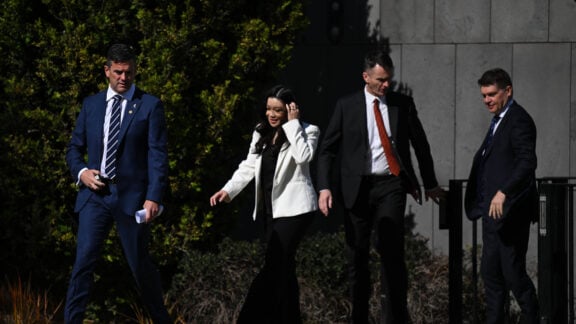Radical Slovenian philosopher Slavoj Zizek recently spoke in New York about the Occupy Wall Street movement. He observed, “One of the good things about the current crisis is that neoliberalism, for reasonable people, is dead”. According to Zizek, the world needs to recognise that we are already experiencing a new form of organised capitalism – one more reliant on strong state intervention?
I think it’s safe to say we’ve noticed that already. The protesters in Tahrir Square, in Homs, Athens, New York City, Melbourne and at the Freeport Mine in West Papua are quite aware that capital has put its jackboots on. In 2011, the state contract to protect its citizens has been publicly trampled in countries around the world. To varying degrees, people everywhere are experiencing the resistance of neoliberal power structures to change. Peaceful protesters have been squirted in the face with pepper spray, shot in the eyes with rubber bullets, teargassed, beaten and killed by representatives of their own states (democratic or otherwise) for daring to challenge the status quo.
State intervention in the economy is devastating lives, in Greece and elsewhere. In the affluent democracies, the middle classes are discovering hunger and homelessness, while executive bonuses reach record levels and Ferrari sales go through the roof. Pippa Middleton was advanced over a million dollars this week, for a book about party planning. How many people are still partying?
The insatiable drive to consume is alive and well, and not just amongst the well-heeled. The annual Black Friday shopping spree in the US was a surreal spectacle of crazed bargain-hunters pepper-spraying and assaulting each other over two-dollar waffle irons.
States are shopping up big, too, especially when it comes to weaponry. Take India, for example. It will test its very first intercontinental ballistic missile in February next year. Australians are told that selling uranium to India is good for the economy. In other words, we should forget our long-term stance on nuclear nonproliferation and think about the money.
We’re told this by a Labor government, with Peter Garrett in the Ministry.
The Occupy Wall Street movement began in New York City as an expression of resistance against corruption and corporate greed. For all its idealism and drumbeating, the movement has mushroomed around the world. Here in Brisbane, passers-by laugh at the ragged band of Occupy protesters, wondering aloud (or on Twitter) what Australians have to protest about, given the health of our economy. I grew up in a Queensland where Bjelke-Petersen made protesting illegal, so it warms my heart to see any demonstration in the city, but the question still surprises me. Movements like these are expressions of solidarity between citizens who wish to voice dissent in a public forum. The Occupy movement rejects the concept of state as instrument of perpetual war and handmaiden to corporate interests. That’s as valid an issue in Australia as it is anywhere else. But even if that weren’t the case, have we forgotten entirely the concept of solidarity? I suspect we have.
Solidarity is a powerful concept, sadly a novel one for many young people in affluent democracies, where neoliberal economic policy has all but erased the unions and the notion of collective action. It’s a word we haven’t heard much since Lech Walesa and his Solidarity movement led Poland out of communism and into the free market back in 1989. Soon after, Germans pulled the Berlin Wall down with their bare hands and Gorbachev pulled Soviet troops out of a war they couldn’t win in Afghanistan. The world heaved a sigh of relief as the nuclear arms race was abandoned and weapons were dismantled. A lone student faced down a convoy of tanks in Beijing. Sometimes people power works, and sometimes it does not.
At the end of the Cold War, communism was pronounced a failure. Thomas Friedman wrote The Lexus and the Olive Tree and it was every man for himself on the globalized electronic markets. We were all going to be free and rich, if we knew how to play the game, Friedman promised. Francis Fukuyama trumpeted a Hegelian end of history and the triumph of neoliberal capitalism.
Twenty odd years later, neoliberalism is pronounced dead on Wall Street and students are being run over by tanks once again. The arms race is revving its engines and there’s a wall in Israel nobody is talking about. As Plato said, excess generally causes reaction and produces a change in the opposite direction, whether it is in the seasons or in individuals or in governments. Neoliberalism may be dead for reasonable people but for the unreasonable, those who have benefited through corruption, nepotism and greed, it is alive and kicking – with jackboots and teargas. People will always tolerate the status quo until it becomes intolerable. Then the pendulum swings.
* Joanne Lock is an independent writer based in Australia. She studied political science and international relations at the University of Queensland. To contact Joanne or to read more of her work, please visit www.joannelock.com








